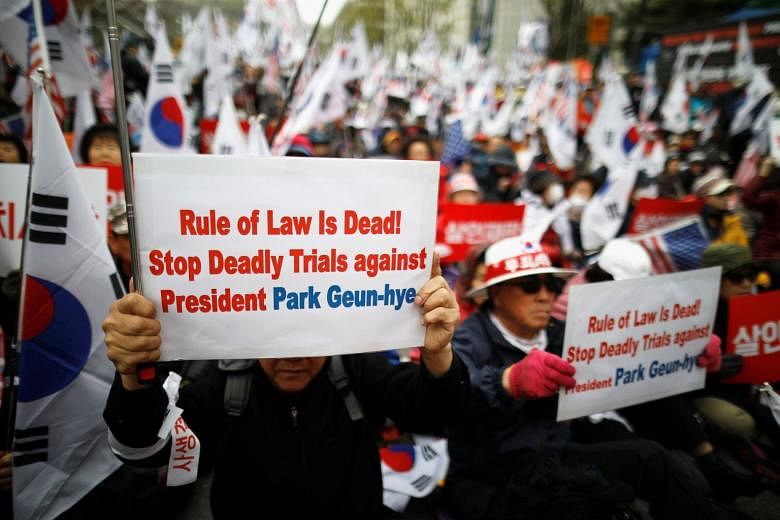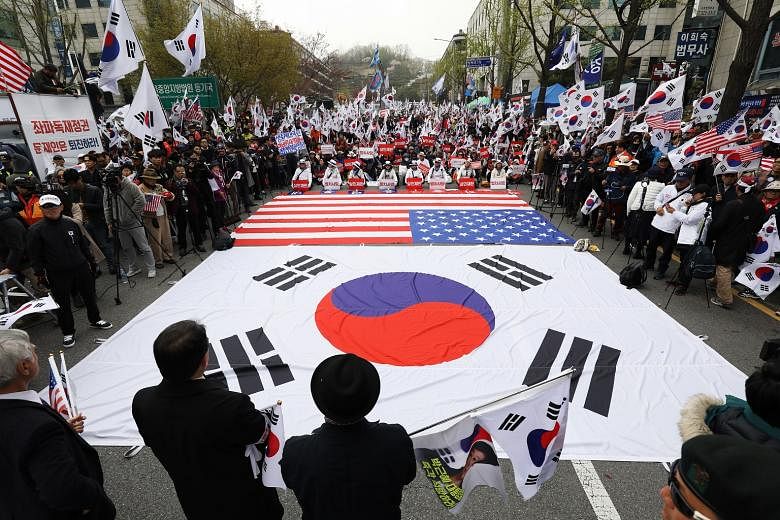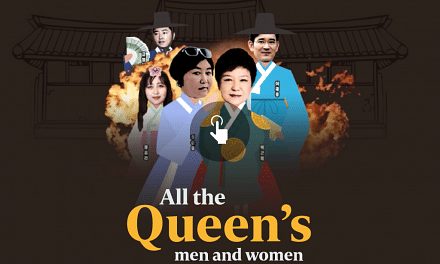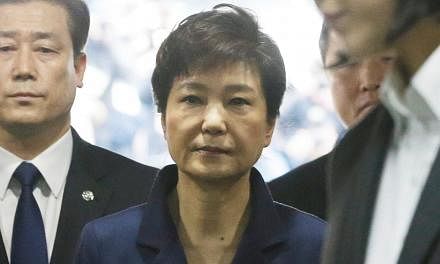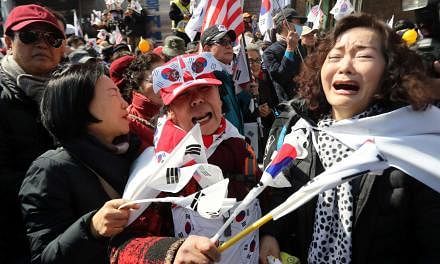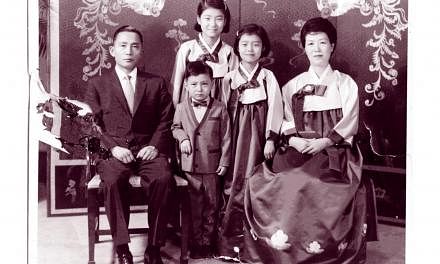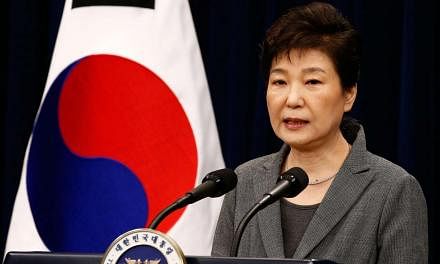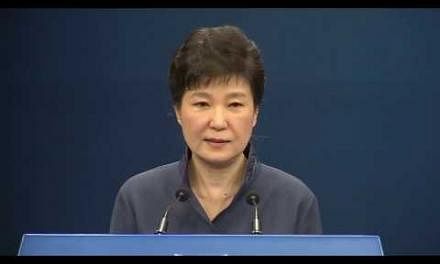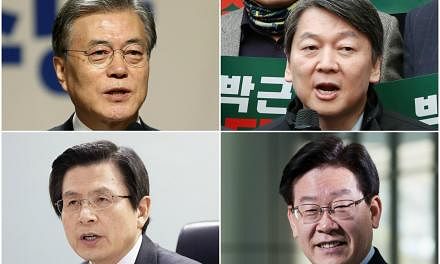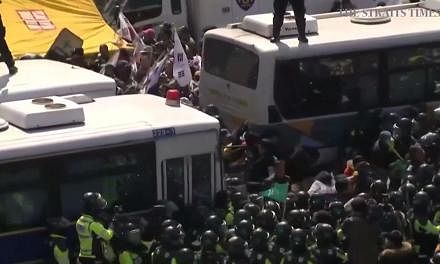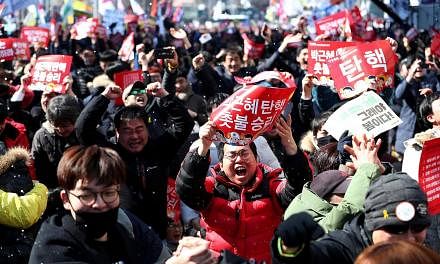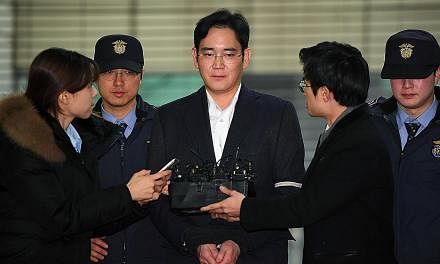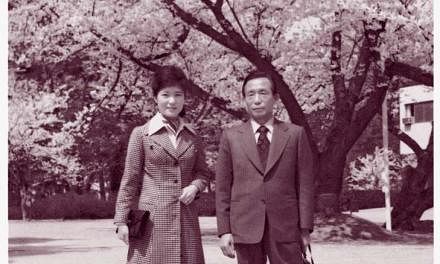SEOUL (AFP, REUTERS) - South Korea's disgraced former president Park Geun Hye was jailed for 24 years on Friday (April 6) for corruption, closing out a dramatic fall from grace for the country's first woman leader who became a figure of public fury and ridicule.
The sentence followed a trial lasting more than 10 months which ended with Park being found guilty on multiple criminal charges, including bribery and abuse of power.
The court ruled that Park colluded with her long-time confidante, Choi Soon Sil, to receive tens of billions of won from major South Korean conglomerates to help Choi's family and fund non-profit foundations owned by her.
"The amount of bribery the accused received or demanded in collaboration with Choi amounts to more than 23 billion won (S$28.6 million)," Judge Kim Se Yoon said, referring to Choi. "I sentence the accused to 24 years in prison and 18 billion won (S$22.3 million) in fines."
The judge said Park had shown "no sign of repentance" but had instead tried to shift the blame to Choi and her secretaries. "We cannot help but sternly hold her accountable," Kim said.
Park, 66, apologised at her trial for seeking help from Choi, who held no formal position or security clearance, but that was as close as Park came to admitting any guilt.
Up to 1,000 Park supporters gathered outside the court Friday, holding national flags and signs calling for an end to"political revenge" against her.
She boycotted most of the trial in protest at being held in custody and was not present in court for Friday's judgement which, in a rare move, was broadcast live on television.
She had been expected to learn her fate at the detention centre near Seoul where she has been in custody for almost a year. Park has refused to see any visitors, including her brother and sister, except for her two lawyers.
Kang Chul Koo, one of Park's state-appointed lawyers, said he would discuss with her the possibility of an appeal. "We tried our utmost but regret the result turned out very bad," Kang told reporters at the court. "The truth will be revealed one day."
The daughter of assassinated dictator Park Chung Hee, Park took office in 2013 as a conservative icon who cast herself in the role of daughter of the nation - incorruptible and beholden to none.
Less than four years later, she was impeached, stripped of all her powers and ousted from office on the back of months-long mass protests that brought millions onto the streets of Seoul and other cities.
The trigger was a snowballing graft scandal involving Park and Choi and accusations of graft, influence-peddling and taking bribes from corporate bigwigs in exchange for policy favours.
Much of the public anger was focused on Park's relationship with Choi and accusations that she let her childhood friend meddle in state affairs, including high-level appointments and editing official speeches.
The court found Park guilty of colluding with Choi to receive about 7 billion won each from Lotte Group, a retail giant, and Samsung, the world's biggest maker of smartphones and semiconductors, while demanding 8.9 billion won from SK, an energy conglomerate.
Most of the money was intended to bankroll non-profit foundations run by Choi's family and confidants, and to fund the education of Choi's horse-riding daughter, the court said.

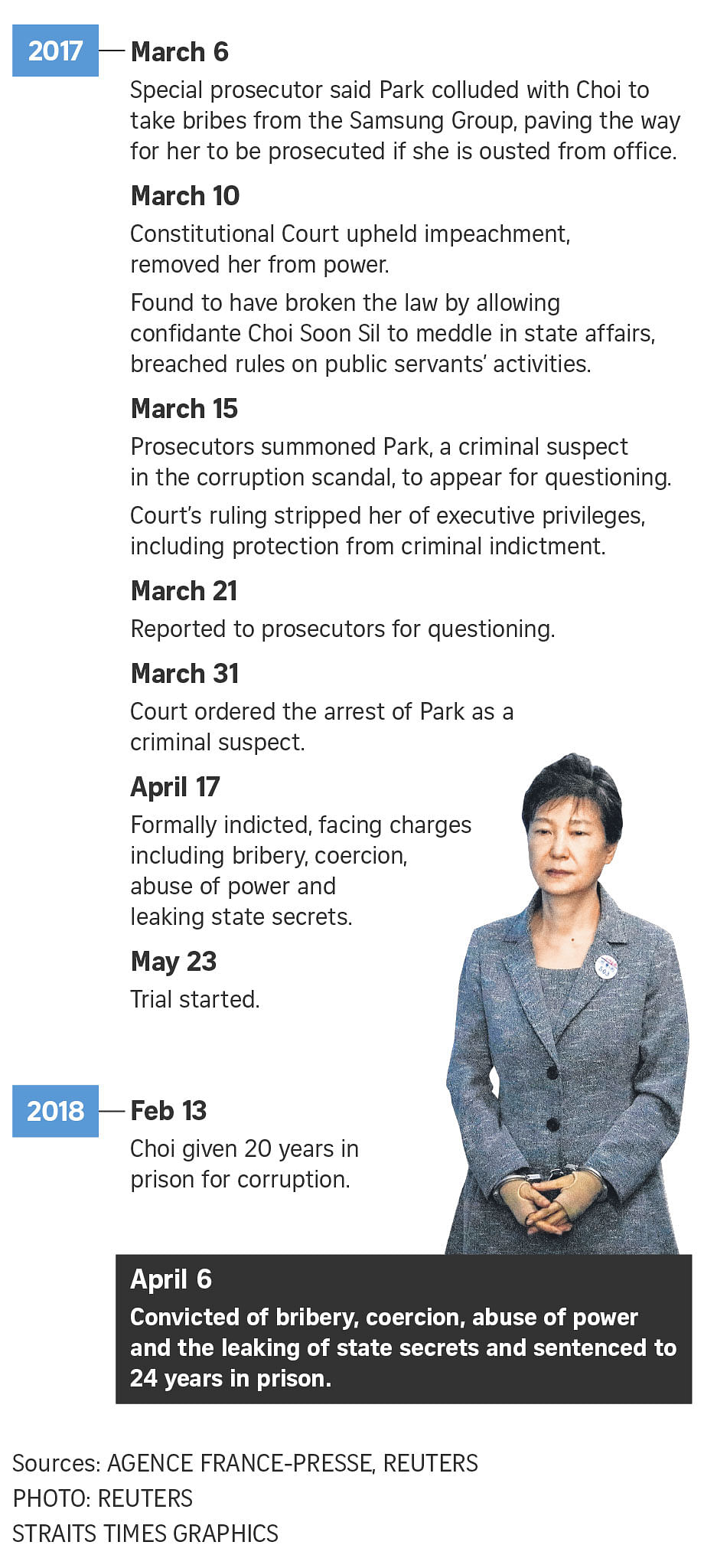
A KOREAN 'RASPUTIN'?
Choi is the daughter of a shadowy religious figure who had served as a mentor to Park for decades until his death in 1994. She was tried separately and sentenced in February to 20 years in prison.
Condemned in the media for her "Rasputin-like" influence over Park, Choi was convicted of using her presidential ties to squeeze tens of millions of dollars out of major South Korean businesses.
The scandal reignited public criticism in South Korea of the cosy and often corrupt ties between top officials and the powerful, family-run conglomerates - called "chaebol" - that dominate the world's 11th-largest economy.
The chairman of the Lotte Group, the country's fifth-largest conglomerate, Shin Dong Bin, was jailed for two years and six months.
Samsung Group heir Lee Jae Yong was jailed for a similar term on charges of bribery and embezzlement but in a surprise decision in February, an appeals court freed him after a year in detention.
Park becomes the third former South Korean leader to be convicted on criminal charges after leaving office, joining Chun Doo Hwan and Roh Tae Woo, who were both found guilty of treason and corruption in the 1990s.
Park's presidential predecessor Lee Myung Bak is currently in custody as prosecutors investigate multiple corruption charges involving him and his relatives.
Chun and Roh received presidential pardons after each spent around two years in jail - a privilege that may elude Park for many years, said Jeong Han Wool, an analyst at the Seoul Hankook Research think-tank.
NO REMORSE
"Park has denied all charges against her and expressed no remorse or atonement - legally as well as politically - for what's probably the most shocking political scandal in our modern history," Jeong told AFP.
"Given her attitude and public anger over her scandal that remains raw, it will be difficult to create a political environment in favour of her release anytime soon."
Park's left-leaning successor, Moon Jae In, came to power largely because of the public backlash against her and her conservative party, dimming hopes for a pardon under the current administration, he added.
Moon's office said Park's fate was "heartbreaking" not only for herself but for the country, and added that history that was not remembered history would be repeated. "We will not forget today," the office said.
There is some residual sympathy for Park among her core supporters, who have always seen her as a heroically tragic figure who lost both her parents to assassins and devoted her life to the service of her country.
The fact that she never married or had children was part of her appeal, given the nepotistic tendencies of many senior officials.
"I'm married to the Republic of Korea. I have no children.South Koreans are my family," she once declared.
Most of her supporters are older conservatives who remember her father's authoritarian 18-year rule, beginning in 1961, when their country began its remarkable surge towards becoming an economic power.
Outside the courthouse, her supporters waved flags and chanted slogans proclaiming her innocence in front of a heavy police presence.
One 57-year-old Park supporter, who identified himself by the surname Yom, told Agence France-Presse: "President Park is an innocent victim of a political revenge." But for her opponents, Park has become a figure of public fury and ridicule.
But for the vast majority of Koreans, she has now been permanently disowned, and will go down in history not as the country's first woman president but the first democratically-elected leader to be forced from office.


